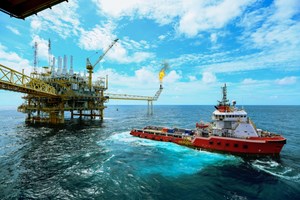Africa’s oil and gas industry is entering a new phase of consolidation and exploration as mergers, acquisitions, and fresh licensing rounds reshape the continent’s upstream landscape heading into 2026.

offshore Nigeria. Image: African Energy Chamber
According to the African Energy Chamber’s State of African Energy 2026 Outlook, M&A activity across the continent is accelerating amid strategic portfolio realignments by international oil companies (IOCs), global independents, and emerging African operators. The combination of divestments from legacy assets and new investor-friendly licensing terms is driving renewed interest across both mature and frontier basins.
Globally, upstream M&A totaled about $51 billion in the first half of 2025, down from the previous six months, as market volatility and trade uncertainty prompted companies to prioritize balance sheet strength and capital discipline. While deal-making slowed in North America, transactions in Africa are rising as operators reposition portfolios and capitalize on divestments by major producers.
In Nigeria, indigenous operators continue to expand their footprint through asset acquisitions from global majors. Notable transactions include ExxonMobil’s sale of a 30% operated interest in Mobil Producing Nigeria Unlimited to Seplat Energy, Eni’s transfer of its onshore subsidiary to Oando, and TotalEnergies’ and Equinor’s asset divestments to Chappal Energies Offshore. In March 2025, Shell completed the sale of its onshore subsidiary, Shell Petroleum Development Company of Nigeria Ltd., to Renaissance, a consortium of five mostly local E&Ps.
These transactions underscore a broader trend of local operators assuming control of onshore assets, while IOCs maintain their focus on offshore and deepwater developments. Shell’s recent final investment decision (FID) on the Bonga North deepwater project reflects renewed confidence in Nigeria’s upstream outlook under the framework of the Petroleum Industry Act, which has streamlined divestment approvals and clarified fiscal terms.
Elsewhere in Africa, international trading and energy companies are reshaping portfolios. Vitol’s $1.65 billion acquisition of Eni assets in Ivory Coast and the Republic of Congo expanded its footprint and secured LNG trading synergies, while Shell’s $510 million purchase of TotalEnergies’ 12.5% stake in Nigeria’s Bonga field reflects a strategy focused on high-return projects.
Meanwhile, licensing rounds across the continent are fueling fresh exploration opportunities. Algeria’s first bid round in a decade awarded five of six available blocks, offering improved fiscal and royalty terms. Libya also reopened its upstream sector with its first licensing round in 17 years, offering 22 blocks under revised production-sharing conditions. Other countries — including Angola, Sierra Leone, Congo, and Tanzania — are expected to advance delayed bid rounds in 2026.
According to NJ Ayuk, Executive Chairman of the African Energy Chamber, consolidation among mid-sized and independent African companies is expected to accelerate next year. “The African oil and gas sector is set for significant consolidation in 2026, particularly among midsize and African independent companies,” Ayuk said, adding that stock-for-stock transactions are becoming more common as companies pursue scale and efficiency.
As global operators streamline portfolios and local independents expand their reach, 2026 is shaping up to be a defining year for Africa’s upstream industry — one characterized by consolidation, exploration, and renewed investor confidence in the continent’s resource potential.
Image and report courtesy of African Energy Chamber

